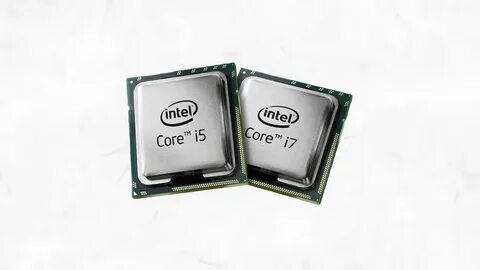
i5 vs i7 Gaming: The Ultimate Face-Off
- Sep 18, 2024
- | 56
One of the most critical decisions when building or upgrading a gaming PC is choosing the right processor. Intel's i5 and i7 CPUs have dominated the mid-to-high-end gaming market for years. Both offer solid performance, but which one is truly better for gaming?
The basic difference between the i5 vs i7 processors for gaming is their processing power, resolutions, and cores. The i5 processor has 6 to 10 cores and high clock speeds, while the i7 processor has many cores, like 8 to 16, and hyper-threading capabilities.
The i7 processors are well suited for CPU-intensive tasks or games due to their extra power. On the other hand, i5 processors can also handle mid-tier gaming.
Let’s discuss the capabilities of both processors below.
Understanding Core i5 and Core i7
The first step towards this faceoff is understanding what i5 vs. i7 for gaming offers to your setup.
Intel Core i5: The Mid-Range Powerhouse
Intel Core i5 processors are known for offering balanced performance at a mid-range price point. Depending on the generation, Core i5 CPUs typically feature four to six cores and eight to twelve threads. They provide a good balance of performance and efficiency, making them suitable for various applications, from everyday computing to gaming.
Key Features:
- Core Count and Threads: Core i5 CPUs generally have 4 to 6 cores and 8 to 12 threads, which is sufficient for most modern games.
- Base and Boost Clock Speeds: They offer respectable base and boost clock speeds, contributing to decent performance in gaming and multitasking scenarios.
- Integrated Graphics: Many-Core i5 models come with Intel’s integrated graphics, which can handle casual gaming and multimedia tasks without a dedicated GPU.
Intel Core i7: The High-Performance Contender
The Intel Core i7 processors are designed for users who need extra power. They typically feature 6 to 8 cores and 12 to 16 threads, providing superior performance for demanding applications, including gaming and content creation.
Key Features:
- Core Count and Threads: Core i7 CPUs generally have 6 to 8 cores and 12 to 16 threads, allowing for better multitasking and enhanced performance in gaming.
- Base and Boost Clock Speeds: With higher clock speeds and thermal design power (TDP), Core i7 processors can handle more intensive tasks and provide a smoother gaming experience.
- Integrated Graphics: Some Core i7 models include Intel’s integrated graphics, though a dedicated GPU is recommended for serious gaming.
Performance in Gaming
Core i5: Adequate for Most Games
For many gamers, a Core i5 processor is more than sufficient. These CPUs easily handle modern games, especially when paired with a capable GPU. Here’s how Core i5 processors perform in various gaming scenarios:
1. Frame Rates and Resolution
Core i5 processors deliver high frame rates at 1080p resolution, ensuring a smooth gaming experience. While Core i5 CPUs can manage 1440p gaming quite well, they might struggle with 4K gaming, whereas a Core i7 or higher would be more beneficial.
2. Multi-Threaded Performance
Many modern games are optimized for single-threaded performance. Core i5 CPUs usually handle these games efficiently with their high frame rates and minimal lag. A Core i5 may be limited compared to a Core i7, especially in cases that include extensive background processes for games that leverage multiple cores.
Core i7: Superior Gaming Performance
The Core i7 processors are designed to handle high-performance gaming and other demanding tasks. Here’s a breakdown of their gaming capabilities:
1. Frame Rates and Resolution
Core i7 CPUs deliver even higher frame rates at 1080p compared to Core i5 processors, providing a more fluid gaming experience. Core i7 processors perform the best at higher resolutions, ensuring smoother performance and higher frame rates. It benefits gamers using high refresh-rate monitors or those who want to future-proof their setup.
2. Multi-Threaded Performance
Core i7 processors offer superior single-threaded performance to enhance gameplay in games that prioritize single-core efficiency. These CPUs shine due to their higher core and thread count, ensuring excellent performance even under heavy loads for games that utilize multiple cores.
Price-to-Performance Ratio
Price-to-performance ratio explains that the price that you are paying for your processor is worth the performance that you are getting for the same.
- Core i5: Budget-Friendly Option
One of the key advantages of the Core i5 is its cost-effectiveness. These processors provide solid performance for their price and become an attractive option for gamers on a budget. The lower cost of a Core i5 CPU allows for more flexibility in other components, such as a higher-end GPU or additional RAM.
- Core i7: Premium Performance
While Core i7 processors are more expensive, they offer enhanced performance that justifies the higher price for serious gamers and those who use their PCs for demanding tasks beyond gaming. The extra investment in a Core i7 CPU can translate into better performance and longevity, particularly for users who plan to run intensive applications or engage in tasks like video editing alongside gaming.
Power consumption and heat output
Power consumption and heat output are highly important factors in a gaming setup, whether your laptop or PC. So, both of these processors differ in heat generation and consuming less power. Let’s see-
- Core i5: Balanced Power Usage
Core i5 processors typically consume less power than their Core i7 counterparts, which can help maintain lower system temperatures and reduce energy costs. This makes them a good choice for systems where energy efficiency and quieter operation are priorities.
- Core i7: Higher Power Demands
Core i7 processors generally have higher power consumption and heat output, necessitating better cooling solutions. This could mean investing in more robust cooling systems or ensuring adequate airflow in your PC case. The increased power requirements and heat should be considered, especially in smaller or less well-ventilated cases while the performance gains are significant.
Conclusion
Choosing between an Intel Core i5 and a Core i7 gaming processor depends on your specific needs, budget, and long-term goals. The core i5 processor offers excellent performance for its price and makes a good option for most gamers.
On the other hand, the i7 processor provides top-tier performance and future-proofing abilities that adhere to enthusiasts and people who look forward to gaming performance.
You can make the best and most informed decision that aligns with your gaming needs and system requirements by considering several factors like performance, price-to-performance ratio, future proofing, and power consumption as well.
Read more: Intel 13th-Gen vs. 14th-Gen for Gaming Laptops: Which One to Buy?

2.jpg)



.jpg)